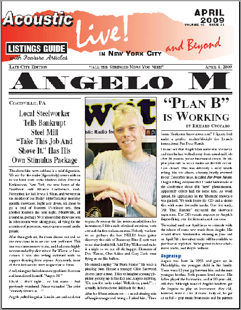Angelo M
"Plan B" is Working
by Richard Cuccaro
--------------------------------------------------------
Coatsville, PA
Local Steelworker Tells Bankrupt
Steel Mill "Take This Job And Shove It."
Has His Own Stimulus Package
--------------------------------------------------------
The above fake news subhead is a brief digression. We ask that the reader (figuratively) return with us to our hotel room at the Hudson Valley Resort in Kerhonkson, New York, the new home of the Northeast Folk Alliance Conference, mid-November, last fall. It was 1:30am, and we were in the
middle of our Friday night/Saturday morning guerilla showcases. Eight acts down, six more to go, a total of fourteen 15-minute sets, then another fourteen the next night. Meanwhile, all around us, perhaps 30 or more other showcase sets in other rooms were taking place, all vying for the attention of presenters, venue operators and media people.
After the eighth set, the room cleared out and no one new came in to see our next performer.
This one was someone new to me, and had come highly recommended by slide wizard Pat Wictor, so I was curious. I was also feeling awkward with no support showing from anyone. Apparently, most of the talent-seekers were as ignorant as I was.
A tall, trim gray-haired man stepped into the room and introduced himself: "Angelo M." Uh-oh… that's right… no last name. I had previously wondered: Prince wannabe? The artist "formerly known as…?"
Angelo pulled his guitar from its case and sat down to play. As soon as the first notes cascaded from his instrument, I felt a rush of mixed emotions, both awe and further embarrassment. Nobody was here to see perhaps the best NERFA blues guitar discovery this side of Beaucoup Blue (I can't wait to see that double bill. Add Toby Walker and make it a triple so we can all die happy). Elements of Doc Watson, Chet Atkins and Gary Davis were flying at me like bullets.
He started singing "Far From Home," his voice a pleasing burr. Picture a younger Clint Eastwood able to carry a tune. (I like to imagine a young git-picker getting up in his face and Angelo replying, "Do you feel lucky today? Well, do ya, punk?" … actually, he's much too laid-back for that.)
After his fifteen minute set -- a mind-altering mix of boogie-woogie and twang -- I asked him, "Does Jorma Kaukonen know about you?" I figured he'd make a perfect teacher/disciple for Jorma's instructional Fur Peace Ranch.
I found out that Angelo's last name was Melasecca and that he had walked away from a steel mill job after 30 years to pursue his musical dream. At 50-plus years old, he was a rookie on the folk circuit.
Case closed. This was definitely a story worth telling. His first album, a beauty, briefly reviewed in our December issue, is called Far From Home. I began telling everyone that I could buttonhole at the conference about this "new" phenomenon. Apparently others had the same idea. As word spread,
his appearance in the Tricentric showcase was packed. We took home his CD and a demo disc with some live radio tracks. One live track, "All That Runnin" recreated the showcase experience.
The DJ's ecstatic response to Angelo's fingers flying over the frets mirrored our own.We waited until our April issue to coincide with the release of some new music from Angelo. His second album Steelwork is releasing in June and on April 7th a few select tracks will be available
to purchase as mp3 files .We've gotten to hear a half-dozen tracks, and they're brilliant.
Beginnings
Angelo was born in 1955 and grew up in Philadelphia, the youngest child in his family. There was a 12-year gap between him and the next youngest brother. Both parents loved music. His father played the harmonica, and at 90 years old, still does. Although none of Angelo's brothers got the impulse to
play an instrument, they did, however, listen to a lot of music. Early on, he got an earful -- pop music from radio and his parents record collection -- and his brothers' inclination for 50's rock and roll.
When he was around 6 years old, Angelo began asking for a guitar. He had fallen in love with the sound of Duane Eddy and would mimic the twangy sound with his voice. It took his parents a while to get the idea that the "naow, naow" sounds were the root of something serious. They bought him his
first guitar when he was 8 years old. Although he wanted an electric, they bought him an acoustic. He acknowledges that it was the right move. There was lots to learn before tackling rock 'n roll.
His first teacher gave lessons in students' homes. He came to the house for about two years and, using the Mel Bay method, taught a lot of theory, while pointing out where Angelo should place his fingers. There were no demonstrations, though. The teacher was actually a sax player! In the long run, it didn't matter. The theory and basics would form a bedrock for everything that came later. He'd listen to Chet Atkins and think, in amazement, that there was a lot more going on there than what he was getting in songs like "Camptown Races" and "Little Brown Jug." He started to ad-lib in places and the teacher would tug on the reins, saying, "Slow down. We'll get to that that later." For Angelo, "later" came a lot sooner.
There was a friend in the neighborhood who was also getting lessons and he and Angelo got together to jam. Another neighborhood friend was learning drums, and the three of them began playing together.
By now, Angelo had his electric and had begun rocking out. In the third grade, they were called on to perform in school assemblies. Then, before he was 10 years old, the boys got their first real "gig."
A girl who was a classmate hired them for her birthday party. Angelo recalls that they didn't know more than 3 or 4 rock songs, which they played over and over. If you can imagine two or three hours of that surf classic, "Wipe Out," plus a couple of other songs, you'll get the idea. No matter… for those
kids, it was a big success. The three boys' parents noticed that they were sounding better and better, and bought "fake books" full of standard pop hits for them to learn. The idea was to then get them playing for tips on weekends at the VFW hall for an adult audience. They played material like polkas and songs like "Spanish Eyes" for the older audience and went home with $50 to split between them. That's a whole lot of soda and popsicles. The boys were in hog heaven.
Angelo recalls some distractions, such as an infatuation with skateboarding, and after a couple of banged-up body parts, he decided that he'd better protect his musical toolkit. Playing guitar was pleasure number one.
It was the early 60's and the sounds of the British invasion overtook 50's rock. As with everyone else coming of age back then, The Beatles changed everything and the Rolling Stones followed immediately after. Every band wanted to play their hits and typically, that's what they did.
The Four Sunns
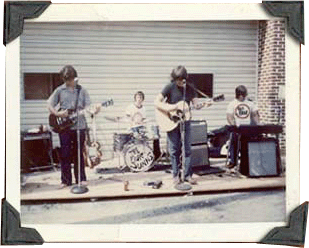
The Four Sunns at a gig in front of a firehouse. Angelo is second from the right on acoustic guitar.
Angelo's musical direction followed a standard path in the early years. His fairly typical musical journey continued through high school and, after joining a couple of different bands, he settled in with three other friends, calling themselves The Four Sunns. Two guitars, a keyboard player and a drummer. Angelo shared the rhythm guitar parts and took care of the lead guitar runs.
This would prove to be a long relationship -- the men are still friends today. Like a lot of bands, even during high school, they found a lot of work. There were beach-bar gigs , class reunions, and …weddings. Again, along with the other band members, Angelo was called upon to play music for an older set. "All the songs you hear a wedding band do," he states. Again, it was "Spanish Eyes" and the never-to-be-forgotten "Night Train" [It was also a burlesque standard. I can still hear the thumping bass line and three-thud end-line
beat and envision a stripper sliding the bra strap off her shoulder.] There were the old pop standards and slow-dance numbers from singers like Eddy Arnold and Dean Martin. The old Italian standby, "Santa Lucia" offered Angelo
a chance to play two-note chords to simulate the mandolin. They'd do the rock covers for the younger set in the latter part of the evening. Although, in playing the old standards, there was a residual feeling of "selling out,"
for the sake of making a buck, Angelo still had fun, seeing the older folks having a great time dancing to their music.
The Mill
Angelo got married young, right out of high school. He worked a couple of jobs before getting an offer, at 18 years old, to make a solid paycheck and find security at the Lukens Steel Mill in Coatesville, PA, about 30 miles
west of Philadelphia. Music, for all the members of the band, was not considered as a life path. Angelo and the others settled down and had jobs and started families. For the next 30 years, he'd put on work clothes and a hard hat and report to the mill. In the early years it meant working a "swing shift"… usually this means 7am to 3pm one week, 3 to 11 the next week, then 11pm to 7am the week after that. Then repeat the cycle again. On the title track of his his upcoming CD, "Steelwork," he sings. "It was dirty and hot in the summertime, in the winter it was dirty and cold." [This author spent 4 post-graduate (art degree) years in a steel mill and can attest to its truth.]
Luckily, Angelo had mechanical skills. He was an electrical technician and saw all parts of the plant. but was mainly employed in the melt shop. After receiving special training in a new form of automated technology, he mainly
worked the "day shift." There were dangers in the mill and he remembers accidents claiming more than a few lives. He can tell some hair-raising stories. The music, though, still drifted in the background. Every so often, the Four Sunns would get a call and work a wedding gig. They never lost touch.
The Fingerstyle Awakening
For the 30 years as a millworker, Angelo never put his guitar aside. It was there in the evenings (or days when he worked nights). He'd play instead of watching TV and play while he watched TV. Weekends during the warmer
months, he'd get together with friends and jam on the deck out back. There was one special friend, Ed Davis, from West Virginia, who changed everything. Angelo recalls, "He played guitar like I never heard anybody play before. It was one of the biggest door-openings of my life. To hear someone make so much happen with one acoustic instrument… This guy made everything sound like it was a three-piece guitar trio. He also played clarinet, saxophone, piano, oboe… anything." Angelo had studied some classical guitar and had incorporated a few licks for a different affect on some songs, trying in addition, once in a while, for that "Chet Atkins" effect. Ed showed Angelo that there was more to fingerstyle guitar than he ever imagined, how fingerstyle guitar could be arranged in "original and imaginative ways "not even meant for guitar." Their musical tastes coincided in every area. They'd get together to play for years, "at all hours of the night." Angelo decided that the acoustic guitar was what he craved to use to make music, and swore off the electric with its reverb and distortion boosters for many years (only some recent prodding from musicians looking for a fill-in player would pull him away from the acoustic).
Out Into the World
In the early 1990's, he took his music off the back deck and began looking around at clubs with open mics. At one of them, he met Roger Paisley, a kindred spirit who liked to play the same music. They'd eventually play gigs
together, but Angelo had to make the first move. He scouted the towns around, but nothing too close to home, putting his name as a fill-in in at clubs, in case a musician couldn't make it. A few weeks later, on a Saturday afternoon, he got "the call." Could he come in that evening? He tried to get his buddy to accompany him, but Roger just wasn't ready. A very nervous Angelo strapped on his guitar in a small club in front of a group of around 6-8 enthusiastic listeners. Angelo said (not in these exact words) that if anyone he knew came through the door into the club, he'd need a change of underwear. The gig went very well and was the precursor to many more. He got more offers to play, in a variety of formations. Some were as a duo, with Roger and some were with other players, as a trio. On a few occasions (he was now in demand with certain drummers), he strapped on the electric and did gigs in a few small "power trio" rock groups. On the acoustic side, one club owner picked two other musicians (who Angelo knew, but hadn't played with) and
said, "You three would make an awesome combination. I'm going to book you!" For a few gigs, Angelo played guitar, Dobro and mandolin (he taught himself). They did bluegrass versions of rock 'n roll songs and were "big"
around St. Paddy's Day, he said. At first, not having a name, they let the club owner decide, and he called them "The Three Stooges." Very unfunny, that lasted one gig. A couple of decades beyond twenty-something, for one
week, they went with "The Viagratones," then settled for "Boys with Wrinkles" (nobody says folk music has to be humorless).
Security Down the Tubes
Toward the end of his time at the mill, Bethlehem Steel bought Lukens, then, soon afterward, in late 2002, went bankrupt and was bought out by another company. The mill didn't close, but the Pension Benefit Guaranty Corp. (PBGC) a protective government agency took possession of the pension plan and would pay current pensioners, but to those not reaching the 30 years, would only release a small portion of its value when the men reached Social
Security age. The many years of accrual value was essentially lost. Many men were only weeks away from qualifying for their pension, but nowhere near retirement age. Angelo was five months away. Some men have already passed away, their money unused. Angelo clocked out for the last time in mid 2003. Others continued working, bitterly, never to reach a retirement with a comfortable financial foundation. Many are still there today.
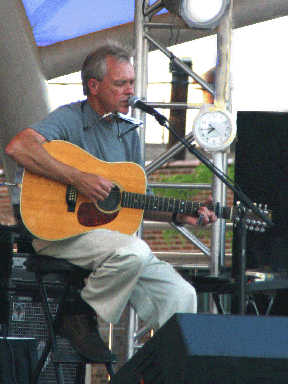
Somebody to Lean On
Angelo had been getting encouragement to go beyond playing covers and write his own music from his friends and family. When it became more obvious that the pension was going bye-bye, he began to pay closer attention to writing his own songs. When he decided to leave the mill, no one was more supportive than Angelo's wife, Jody. Previously divorced, he met Jody at the 1999 Philadelphia Folk Festival. When his future at the mill looked bleak, the two of them hit the highway and did some exploring. As he describes it: "We started checking out different music scenes 'far from home' and on a
kind of 'now-or-never-feeling' / 'what-do-I-have-to-lose-at-this-point' trip, we traveled across the country and I wrote. That began to make it all feel possible and lifted some of the heaviness of the loss. This is when I began to make a shift from doing mostly covers to where I am now able to do a full show -- 1 1/2 hours -- of originals." After hearing this description, the meaning of the "Far From Home" lyrics really sink in:
Now I'm high on a hill
with the ocean below
Just need to see what I already know
After a while I may find my way home
But I don't really think / that my soul wants to go.
One can see the mill worker fade and the full-time musician come into focus.
For giving him the strength to make the transformation, Angelo says of Jody: "without her I may not have believed it was possible… Now she comes and helps with my shows, manages, books and, as some musician friends say, she's my handler. Jody's being such a partner to me in all of this makes it really special."
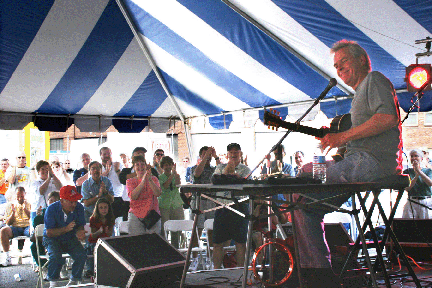
Albums and Airplay
If he was going to get serious about a career in music, Angelo needed some "product." He'd begun writing and made Far From Home which he referred to as a 9-song demo, but which I took to be his first album. Comprised of completely original material, it got airplay in Europe even before it got local airplay. Then its sound spread across the United States, in 40 states, at over 130 radio stations. Two songs were picked up and used as background music by the PBS show "Roadtrip Nation." One of those two tracks was the biographical "Thirty years." Above a tight, muscular dobro lick, Angelo sings, about spending (almost) 30 years in the mill,
"I was doin' all right, doin' it all wrong,
I was doin' it all, thirty years too long…
If it's not too late, gonna play my song…
Why did I wait thirty years too long.
Blake Hodges, the music supervisor for the series states, "Thirty Years" is actually one of my favorite songs on the Roadtrip Nation soundtrack … When I hear a song that I know I could listen to cruisin' down I-40 in a big green RV,
I know it's the right song for RTN."
Given that the series is about people who have reached a crossroad in their lives and take to the road, looking for who they are and what they want, the song is even more appropriate than just a song to cruise along with.
Angelo has reached his own crossroad. He is indeed very fortunate that he had the tools and experience to undertake an alternate plan. He's gone back to the mill from time to time, as an instructor in the technical area that he was
trained in, and has seen first-hand, the bitterness of the men who stayed, whose pensions -- what they worked years for -- were lost. And though his was lost also, shrugging off rancor, Angelo has struck out on his own. In the title track of his new album he sings, "I don't do that kind of steelwork any more."
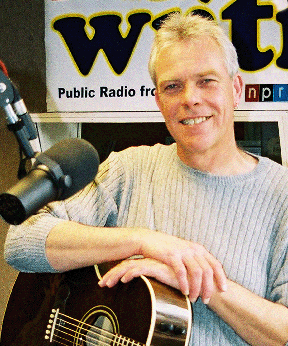
Although his tour schedule doesn't show anything in our area at the moment, we hope that changes soon.
"Plan B" is working.
On-line: www.angelom.com
Upcoming shows include:
April 17 Launch Music Conference Official Showcase, Lancaster, Pa
May 3 LIVE on Air WXPN Folk Show with host Gene Shay (8pm-11pm)
16 9:30pm Lancaster Dispensing Company, Lancaster, PA
June 17 5pm LIVE on Air KPSU Portland, OR
18 7:30pm Artichoke Music Portland, OR
19 8pm SoulFood Redmond, WA
20 7pm Pasta Nova Seattle/Woodinville, WA
22 Recording River City Folk with host Tom May for later broadcast
on XM Satellite Radio & 150 NPR Stations
25 6:30pm Drift Inn Yahats, OR
.
Today
Wikipedia lists Tom’s discogaphy at a hefty 58 albums. Tom has kept his touring at around 40 shows per year, so it’s a good idea to catch him any chance you have. He lives in Alexandria Virginia and does concerts for children and songwriting workshops.
He ends the narrative in his songbook with these words: “So I teach, I write and record, I travel and perform -- all with my partner, Midge, without whom none of this would be still be happening. I am one lucky man.” We’re all lucky to have Tom around. Keep writin’ ‘em Tom… We’ll be
listening.
For those in the NY Metro area, don’t miss his show at The Sanctuary in Chatham, NJ. We’ll be there!
Website: tompaxton.com
Upcoming shows include:
September:
12 - Berkeley, CA - Freight & Salvage - 8 PM
13 - Santa Monica, CA - McCabes
25 - 7:30pm Fairfield, CT - Fairfield Theatre-Stage One
26 - 8pm Chatham, NJ - Sanctuary Concerts

